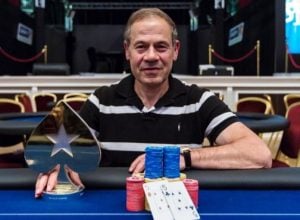Poker Stars founder Isai Scheinberg in negotiations with US prosecutors
January 24, 2020
Poker.com News Team
The news of Poker Stars founder Isai Scheinberg surrendering to US authorities was met with some surprise by the poker community. It, however, is hardly a shock considering he remained the only outstanding key figure of the 2011 US indictment (widely known as Black Friday to seasoned poker players) to not cut a deal. We understand that a deal had been in the works for several years, but some niggling deal terms that could not be ironed out prevented an amiable conclusion. News that Mr. Scheinberg had been physically in Switzerland, and therefore exposed himself to an extradition request, was met with surprise by industry veterans, considering the intelligence of the man, not to mention world class legal advice at his disposal. Its possible that after nine years on the run, he thought his case was low priority and incentive to pursue low. He was clearly wrong, however, US prosecutor Olga Zverovich told the court immediately that deal terms had almost been finalised. Perhaps Mr. Scheinberg gave into that niggling point on his flight to the United States. It likely involves agreeing to a misdemeanor charge related to illegal gambling or bank fraud.
What did they do wrong?
It’s important to note Poker Stars were not listed alone in the Black Friday fifty-two page indictment. Included were the founders and executives of Absolute Poker and Full Tilt poker. The charges levied against the accused included bank fraud, money laundering, and illegal gambling. Considering the specific language they likely relate to the flimsy Illegal Gambling Businesses Act of 1970, which was clearly established long before the internet and relies on state law, which could differ widely across the states. Bank fraud and money laundering charges become irrelevant if the underlying gambling charge does not hold up. For example, during the years leading up to the indictment it was widely known by poker players that they would receive unusual descriptions on their credit card statements, like golf balls and flowers. This was due to the companies and their payment providers miscoding the chip purchases and not using the required 7995 which banks know is the code for gambling. In fact, Poker Stars currently advise players about this code on their site. Money laundering charge is moot if no underlying gambling charge can be made by the prosecutors. In summary, this was never a slam dunk case and why the US prosecutors are very keen to do plea deals and take the cash.
Were all poker companies bad actors?
As far as poker players are concerned, Poker Stars led by Isai Scheinberg are the heroes of poker and here’s why; After the indictment Full Tilt, the biggest competitor to Poker Stars, collapsed due to their inability to payback players. This is completely unacceptable since player funds are promised to be held separately (and in fact obligatory to be licensed by the Alderney gaming regulator). Seeing a disaster in the making, US authorities quickly negotiated a settlement with Poker Stars that included a $730 million civil settlement, of which $180 million reserved to reimburse Full Tilt poker players. Also, Mark Scheinberg the son of the founder escaped the charges brought on his father. So, in a way, the seeds of an overall deal were sown, which is surprising that over seven years have passed since this civil settlement.
While Isai Scheinberg saved the bacon of Full Tilt poker executives, Absolute Poker, led by Scott Tom, is a completely different animal. Absolute was run by a group of college buddies from the university of Montana, who raced down to Costa Rica to take it to industry leaders like Paradise Poker, Party Poker, and Poker Stars. Their high octane lifestyle fueled by parties and mayhem was documented in the book Straight Flush. It seems that living the high life was not enough, as it was established by a community of genius poker players and maths experts that improbable winning patterns were emerging at the tables. It was later determined that a backdoor had been established whereby Absolute management could see the cards of its customers, and decided that rake or commissions were not enough, they could also steal the money from players at the tables. Scott Tom surrendered to US prosecutors in 2017 agreeing to a single misdemeanor charge, which was not taken well by poker players who suffered greatly from his improprieties. Another Absolute Poker executive Brent Beckley surrendered in 2011 to US authorities, and actually served ten months in prison for Absolute misdeeds, which further illustrates how lucky Mr. Tom was to plead to a much less serious misdemeanor charge. Perhaps Mr. Tom had the bigger wallet to negotiate.
We wish Mr. Scheinberg the best, he is highly regarded in the poker community, and always thought of poker players first and foremost. It was he who resisted offering casino games as he didn’t agree it was good for players (its now common place). He is a highly intelligent leader, who deserves the lightest of penalties relative to the other defendants, many who were running highly suspect operations and giving the industry a terrible reputation.



